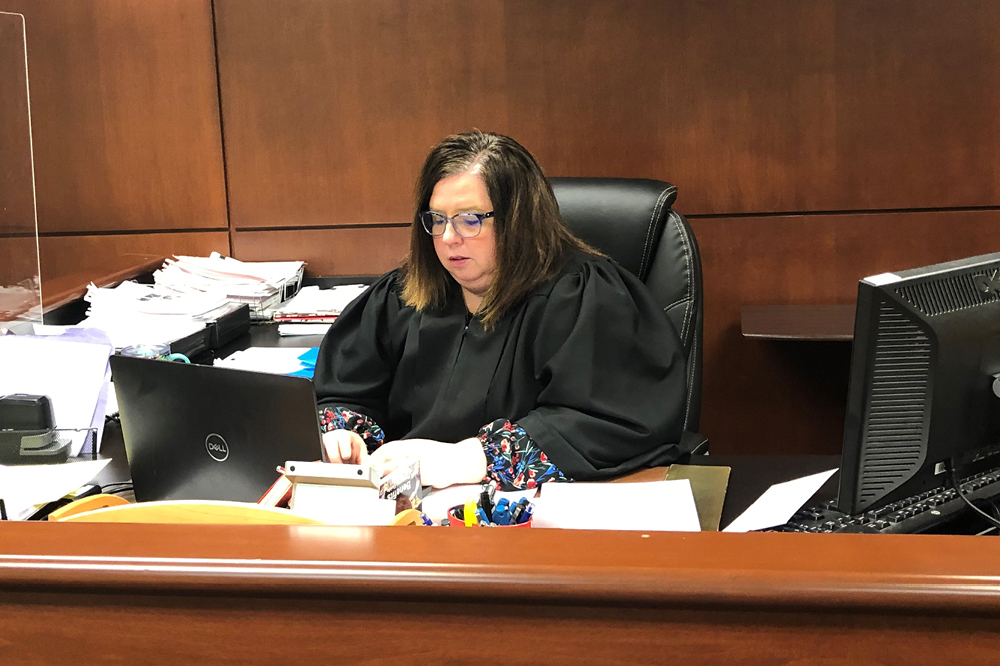Tales of Online Court
Humorous, startling, and heartwarming. A look at the unexpected moments in virtual courtrooms.

Smoke clouded the computer screen in front of Magistrate Jennifer Towell. She was conducting an online eviction hearing during another busy day at Akron Municipal Court. The cloud floated in front of the image of the landlord in the case. He was sitting in a chair holding a cigar.
“He kept puffing, and smoke would cover the whole screen,” Towell said.
It’s one of the novel experiences judges and magistrates are encountering with the advent of online court proceedings, made essential by the COVID-19 pandemic. Maintaining an atmosphere appropriate to the serious nature of a hearing is something court staff regularly deal with inside courtrooms. At in-person proceedings, an attentive bailiff might thwart misbehavior and missteps before and during hearings – addressing inappropriate clothing or cellphone usage, for example.
In today’s more prevalent videoconference hearings, though, participants – many of whom have never been to court – sometimes fall into a more casual stance. That’s despite courts’ efforts to explain rules and expectations in materials sent to the parties beforehand.
Towell and her colleague, Magistrate Kani Hightower, preside over eviction hearings four days a week, holding 20 to 30 each morning. To manage the pace, 15 to 20 people populate the magistrate’s screen simultaneously – similar to how groups of tenants, landlords, and lawyers appear in a physical courtroom, Towell said.
More than one person has logged on to a hearing while stretched out on their beds, she said. She also has asked a man if he was aware that he wasn’t wearing a shirt.
In these situations, judges and magistrates patiently guide the public, reminding them of rules such as no smoking, eating, or drinking during court, as Towell did with the cigar-puffing landlord.
Large Machinery, Hospital Rooms Become Settings for Hearings
Alongside the challenges are the upsides that online court affords many who must deal with a legal matter.
Magistrate Kathleen Lenski of Montgomery County Juvenile Court said video proceedings have helped parents with health issues during important cases involving their children. One mother receiving cancer treatment attended her hearing from her hospital bed. Another mother who was in an accident that paralyzed her needed to be in court to transfer custody of her child to the child’s grandmother.
“The mother could not have been transported to the hearing,” Lenski said. “Zoom allowed her to appear and be a part of the process, which meant a lot to her.”

Hotels and factory floors aren’t out of the ordinary as online hearing backdrops before Montgomery County Juvenile Magistrate Kathleen Lenski.
“I’ve had folks Zoom in who are incarcerated, out of state, and in treatment facilities,” she adds.
The most common scenario now, she said, is attendance from the workplace, such as mothers who log on from hotel rooms they are cleaning and fathers who appear from break rooms. One aunt signed on from her forklift.
She had been given temporary custody of her nieces and a nephew a year earlier. Lenski said everyone agreed the aunt should receive full legal custody, but the court needed to finalize the order on the record.
“She worked in a factory. She had little personal leave time, and what she had she needed to take for the kids in her care,” Lenski said. “Her workplace allowed her a small window so she could participate in the hearing. She did that during a break while sitting on her forklift in her hard hat.”
“I thought it was awesome to see a woman in a factory driving a forklift. She showed us the gears on the truck and how she could handle it,” Lenski adds.
From Dressed-Down to Courtly – Lawyers Have Different Takes
The new normal of online proceedings elicits a range of responses, even from those in the legal profession. Towell said a lawyer, one quite experienced in municipal court, showed up on screen in a tank top. She nudged, “Counsel, would you like to put on a jacket?”
At the other end of the spectrum are attempts to re-create courtroom formality – in all its facets. Judge Mary Jane Trapp recalls a case she and two other judges heard at the Eleventh District Court of Appeals.
“The attorney took this so seriously that he built an entire courtroom in his living room, complete with a trial table, bench, witness stand, lectern, and professional video and sound equipment,” she explains. “I think there was even a flag.”
Overall, Judge Trapp attributes their smooth appellate court sessions to the Eleventh District’s case coordinator, who runs test sessions before oral arguments with each attorney and with people representing themselves. The trickiest, though, are hybrid arguments, in which some attend in person and others online.
When numerous people are logged onto a hearing from separate computers in the same space, feedback and sound delays disrupt discussions. Judge Trapp found a professional microphone that could be used for everyone in a room in place of multiple laptop microphones. She said it greatly improved sound quality and eliminated feedback.
“I became a sound engineer quickly,” she said.
Safety Surfaces as Consideration, as Does Privacy
In another online eviction hearing, Towell noticed a seatbelt strapped across a woman. The magistrate asked whether the woman was driving. The woman responded, “No.” Towell pressed, pointing out that the trees in the background were moving.
“Oh, I didn’t understand the question,” the woman said.
Towell told the woman the hearing would restart once she parked.

Akron Municipal Court Magistrate Jennifer Towell has seen her fair share of people appear for court videoconferences while in moving vehicles.
“That’s a very common occurrence,” Towell notes. “We decided that we won’t take testimony from people who are driving.”
Court staff also now weigh circumstances unique to online hearings. Towell was reviewing the background of an eviction case for the next day. It was a family eviction involving a mother and her son, who was living in his mother’s house. The mother was asking the court to evict her son because he was beating her. She submitted photos of her injuries.
Towell was concerned about the mother discussing her case while there were parties from multiple cases on screen.
“I waited to have her hearing at the very end when everyone else had logged off so that she did not have to testify about the physical abuse in front of a large group,” Towell said. “She was very emotional and thankful.”
“You just want everyone to get justice,” Towell adds. “Computers lose the human element sometimes, so you try to maintain both the human element and the seriousness of the court hearing.”
‘Great Win for Access to Justice’
As judges, magistrates, and court staff keep learning and improving how they run hearings by videoconference, they point to the positives.
“More parties appear for their hearings,” Towell notes. “They generally don’t have to miss work or get childcare as much as they did for in-person proceedings.”
“This has been a great win for access to justice,” Lenski said. “It is a balance, and there has to be a very thoughtful way to go about it so that due process is protected. Planning the hearings in advance takes time, but it is really worth it for those who are appearing in court.”
CREDITS:
